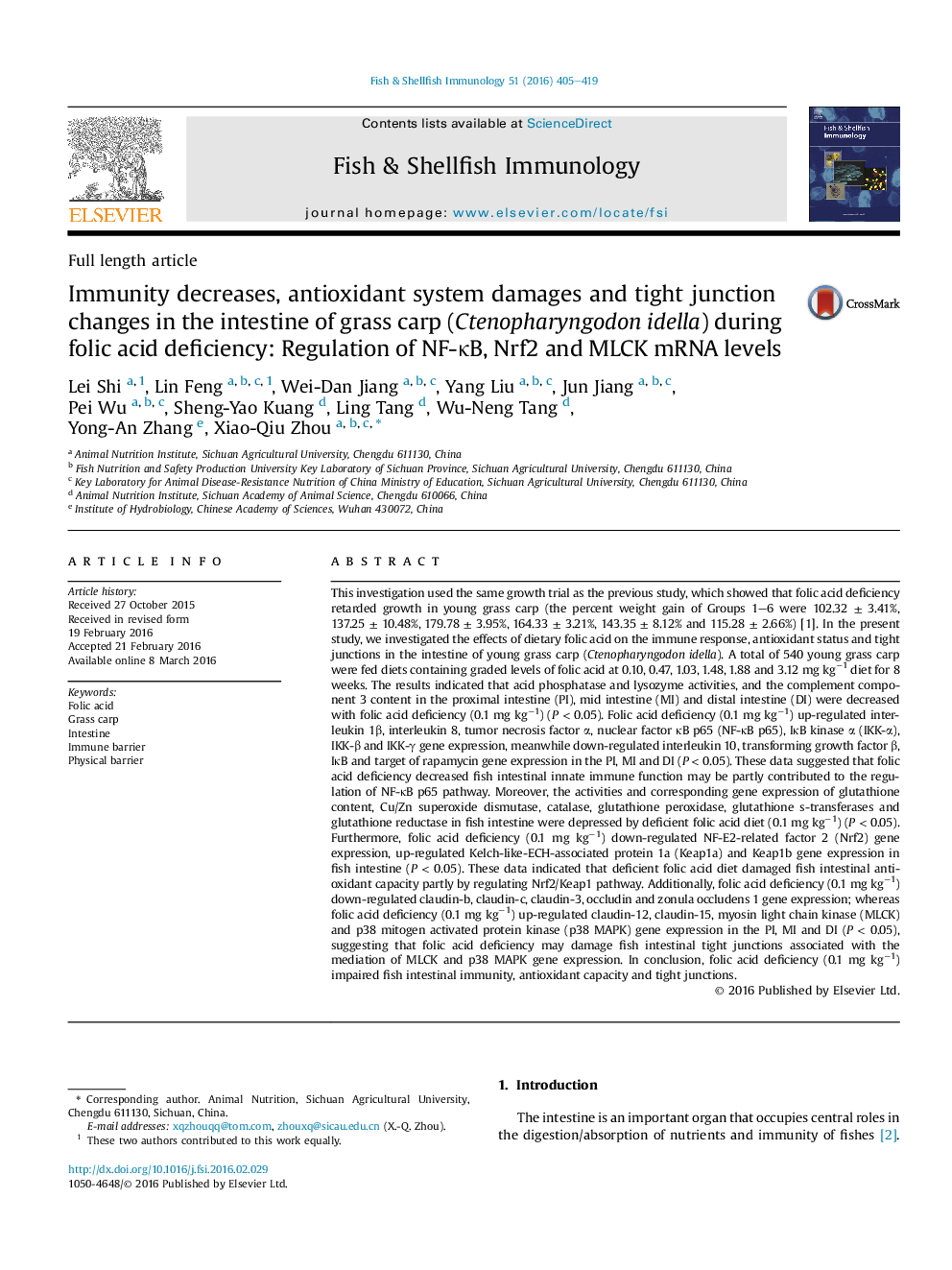| Article ID | Journal | Published Year | Pages | File Type |
|---|---|---|---|---|
| 2430746 | Fish & Shellfish Immunology | 2016 | 15 Pages |
•Folic acid deficiency decreased fish intestinal immune and barrier function.•Folic acid regulated intestinal cytokines associated with NF-κB pathway.•Folic acid increased antioxidase gene expression associated with Nrf2 pathway.•Folic acid regulated intestinal tight junction proteins depended on MLCK pathway.
This investigation used the same growth trial as the previous study, which showed that folic acid deficiency retarded growth in young grass carp (the percent weight gain of Groups 1–6 were 102.32 ± 3.41%, 137.25 ± 10.48%, 179.78 ± 3.95%, 164.33 ± 3.21%, 143.35 ± 8.12% and 115.28 ± 2.66%) [1]. In the present study, we investigated the effects of dietary folic acid on the immune response, antioxidant status and tight junctions in the intestine of young grass carp (Ctenopharyngodon idella). A total of 540 young grass carp were fed diets containing graded levels of folic acid at 0.10, 0.47, 1.03, 1.48, 1.88 and 3.12 mg kg−1 diet for 8 weeks. The results indicated that acid phosphatase and lysozyme activities, and the complement component 3 content in the proximal intestine (PI), mid intestine (MI) and distal intestine (DI) were decreased with folic acid deficiency (0.1 mg kg−1) (P < 0.05). Folic acid deficiency (0.1 mg kg−1) up-regulated interleukin 1β, interleukin 8, tumor necrosis factor α, nuclear factor κB p65 (NF-κB p65), IκB kinase α (IKK-α), IKK-β and IKK-γ gene expression, meanwhile down-regulated interleukin 10, transforming growth factor β, IκB and target of rapamycin gene expression in the PI, MI and DI (P < 0.05). These data suggested that folic acid deficiency decreased fish intestinal innate immune function may be partly contributed to the regulation of NF-κB p65 pathway. Moreover, the activities and corresponding gene expression of glutathione content, Cu/Zn superoxide dismutase, catalase, glutathione peroxidase, glutathione s-transferases and glutathione reductase in fish intestine were depressed by deficient folic acid diet (0.1 mg kg−1) (P < 0.05). Furthermore, folic acid deficiency (0.1 mg kg−1) down-regulated NF-E2-related factor 2 (Nrf2) gene expression, up-regulated Kelch-like-ECH-associated protein 1a (Keap1a) and Keap1b gene expression in fish intestine (P < 0.05). These data indicated that deficient folic acid diet damaged fish intestinal antioxidant capacity partly by regulating Nrf2/Keap1 pathway. Additionally, folic acid deficiency (0.1 mg kg−1) down-regulated claudin-b, claudin-c, claudin-3, occludin and zonula occludens 1 gene expression; whereas folic acid deficiency (0.1 mg kg−1) up-regulated claudin-12, claudin-15, myosin light chain kinase (MLCK) and p38 mitogen activated protein kinase (p38 MAPK) gene expression in the PI, MI and DI (P < 0.05), suggesting that folic acid deficiency may damage fish intestinal tight junctions associated with the mediation of MLCK and p38 MAPK gene expression. In conclusion, folic acid deficiency (0.1 mg kg−1) impaired fish intestinal immunity, antioxidant capacity and tight junctions.
